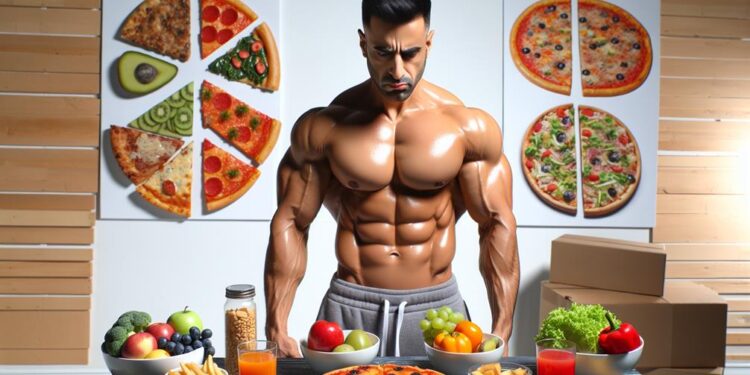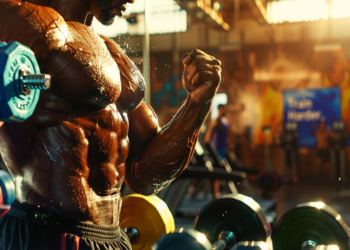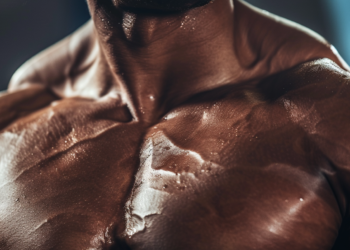Did you know that bodybuilding, a sport often associated with strength and physical prowess, can also be rife with challenges when it comes to maintaining a healthy relationship with food? The pressure to achieve specific body image ideals in the world of bodybuilding can sometimes lead to the development of eating disorders. Understanding the nuances of this issue is crucial for both athletes and fitness enthusiasts. By exploring the complex interplay between bodybuilding and food, you can gain insights that might just reshape your perspective on nutrition and well-being in this competitive arena.
Key Takeaways
- Challenge bodybuilding standards for self-acceptance and positive food relationships.
- Recognize warning signs of restrictive diets, excessive exercise, and body dysmorphia.
- Balance nutrition for peak performance and seek professional help for mental well-being.
- Engage in stress-relief activities, build a support system, and celebrate diverse beauty standards.
The Impact of Body Image Ideals
If you struggle with body image ideals, it's essential to understand how they can impact your relationship with food and your body in bodybuilding. Bodybuilding standards often promote a specific, sometimes unrealistic, ideal body shape and size. This can lead to feelings of inadequacy and pressure to conform to these standards, potentially resulting in unhealthy behaviors around food and exercise.
In the world of bodybuilding, it's crucial to prioritize self-acceptance and focus on what makes you feel strong and healthy rather than striving for an unattainable ideal. Embracing your unique body shape and size can help foster a more positive relationship with food and exercise. Remember, everyone's body is different, and comparison to others can be detrimental to your mental and physical well-being.
Recognizing Warning Signs
Recognizing warning signs of eating disorders in bodybuilding involves staying attentive to changes in eating habits, exercise patterns, and emotional well-being. When it comes to bodybuilding and maintaining a healthy relationship with food, being able to identify concerning behaviors is crucial. Here are some key signs to watch out for:
- Severely Restrictive Diets: Pay attention to extreme limitations in food intake, such as cutting out entire food groups or severe calorie restriction.
- Obsessive Exercise Regimens: Look for excessive exercising beyond what is necessary for muscle growth and fitness goals.
- Body Dysmorphia: Notice if there is a distorted perception of one's body, where individuals see themselves as overweight despite being underweight.
- Social Withdrawal or Mood Changes: Be aware of isolation or shifts in mood, which can indicate underlying emotional struggles related to eating habits.
If you recognize these behaviors in yourself or someone you know, seeking help from a healthcare professional or therapist who specializes in eating disorders is essential for addressing these challenges effectively. Remember, early intervention is key in promoting a healthy bodybuilding journey.
Balancing Nutrition and Performance

To optimize your bodybuilding performance, it is crucial to strike a balance between nutrition and training intensity. When navigating the demands of bodybuilding competitions and the need for peak performance, managing dietary restrictions and meeting competition demands become paramount. Tailoring your diet to support your training goals is essential. Emphasize nutrient timing to fuel workouts effectively and promote muscle recovery.
Meal planning plays a pivotal role in ensuring you meet your macronutrient needs while staying within your caloric requirements. Understanding the timing of your meals concerning your workout sessions can enhance performance and aid in muscle growth. It's important to consider your individual energy needs and adjust your intake accordingly to support your training intensity.
Coping Strategies for Stress
Implementing effective coping strategies for stress is crucial in maintaining your overall well-being and performance in bodybuilding. Stress can negatively impact your eating habits, training consistency, and overall progress. To help you navigate stress in a healthy way, consider the following strategies:
- Practice Mindful Eating: Engage in mindful eating practices to help you stay present and fully enjoy your meals. Focus on savoring each bite, chewing slowly, and paying attention to your body's hunger and fullness cues.
- Incorporate Stress-Relief Activities: Include activities like yoga, meditation, deep breathing exercises, or even a leisurely walk in nature to help reduce stress levels and promote relaxation.
- Establish a Support System: Surround yourself with understanding and supportive individuals who can provide encouragement and help you manage stress during challenging times.
- Prioritize Self-Care: Make time for self-care activities that you enjoy, such as reading, taking a warm bath, or listening to music. Taking care of your mental and emotional well-being is essential for overall stress management and resilience in bodybuilding.
Seeking Professional Help

Navigating stress effectively is crucial for your well-being in bodybuilding, and seeking professional help can provide valuable support and guidance in managing the challenges you may face. When dealing with eating disorders or body image issues, therapy options can offer a structured approach to address underlying mental health concerns. Therapists specialized in bodybuilding-related disorders can assist you in developing healthier relationships with food and your body, aiding in your recovery journey.
| Therapy Options | Nutrition Guidance |
|---|---|
| Cognitive-Behavioral Therapy (CBT) | Individualized meal plans |
| Dialectical Behavior Therapy (DBT) | Nutritional education |
| Acceptance and Commitment Therapy (ACT) | Mindful eating practices |
Professional help can equip you with coping mechanisms to navigate triggers and stressors effectively. Nutrition guidance from dietitians or nutritionists can also play a crucial role in helping you fuel your body adequately for your training needs while maintaining a balanced relationship with food. Remember, taking care of your mental health is as important as your physical well-being in your bodybuilding journey.
Building a Support System
Building a strong support system is essential for sustaining your well-being and progress in bodybuilding. Here are four key ways to build a support system that can help you navigate the challenges that may arise:
- Peer Support: Engage with fellow bodybuilders or fitness enthusiasts who understand the journey you are on. Sharing experiences and insights with peers can provide valuable encouragement and motivation.
- Online Communities: Joining online forums or social media groups focused on bodybuilding can connect you with a broader community. These platforms offer a space to ask questions, seek advice, and receive support from individuals with similar interests.
- Seeking Guidance: Consider working with a coach or mentor who can provide personalized support and guidance. A knowledgeable professional can offer expertise, accountability, and help you stay on track with your goals.
- Family and Friends: Don't underestimate the power of support from your loved ones. Opening up to family and friends about your bodybuilding journey can create a strong support network that encourages you during both the highs and lows.
Embracing Body Positivity

Embracing body positivity involves cultivating a mindset that values self-acceptance and appreciation for your unique physical attributes. It's about fostering self-love and empowerment, recognizing that beauty comes in diverse shapes and sizes. Here are some practical ways to embrace body positivity in your bodybuilding journey:
| Practice Self-Love | Challenge Beauty Standards | Focus on Strength |
|---|---|---|
| Remind yourself of your worth beyond appearance. | Acknowledge and reject unrealistic beauty ideals. | Shift your focus from aesthetics to what your body can do. |
| Celebrate your body's capabilities. | Surround yourself with diverse representations of beauty. | Set fitness goals based on performance rather than looks. |
| Treat yourself with kindness and compassion. | Embrace and showcase your uniqueness. | Find joy in your progress and achievements. |
Frequently Asked Questions
What Are Some Common Misconceptions About Eating Disorders in the Bodybuilding Community?
You might think eating disorders are rare in bodybuilding, but misconceptions exist. Educate yourself on nutrition, avoid stereotypes. Understand that some turn to steroids, impacting mental health. Support those struggling.
How Do Societal Pressures Contribute to the Development of Eating Disorders in Bodybuilders?
Societal pressures can heavily influence bodybuilders, pushing you to extreme measures to meet unrealistic standards. The bodybuilding community's focus on appearance and competition can exacerbate these pressures, leading to the development of eating disorders.
Are There Specific Challenges That Bodybuilders Face When Seeking Treatment for an Eating Disorder?
When seeking treatment for an eating disorder, challenges unique to bodybuilders may arise. These hurdles can include concerns about muscle loss, altered physique, and navigating a balance between recovery and maintaining their athletic goals.
How Can Bodybuilders Differentiate Between Healthy Competition Prep Practices and Disordered Eating Behaviors?
Feeling torn between dedication and obsession? Notice red flags like constant guilt or distorted body image. Establish boundaries; prioritize health over extremes. Balance is key; seek guidance if in doubt. Your journey matters.
What Role Does Social Media Play in Perpetuating Unhealthy Relationships With Food and Body Image in the Bodybuilding Industry?
Scrolling through social media, you're bombarded with idealized bodies and lifestyles. Bodybuilding's emphasis on aesthetics intensifies body image pressure. Social media influence can skew perceptions, leading to unhealthy relationships with food and unrealistic expectations.
Conclusion
In conclusion, navigating a healthy relationship with food in bodybuilding is like finding your way through a maze – challenging but achievable with the right mindset and support. By recognizing warning signs, balancing nutrition with performance, and seeking professional help when needed, you can overcome eating disorders and embrace body positivity. Remember, you are not alone in this journey, and with determination and self-care, you can achieve your goals while maintaining a healthy relationship with food.













